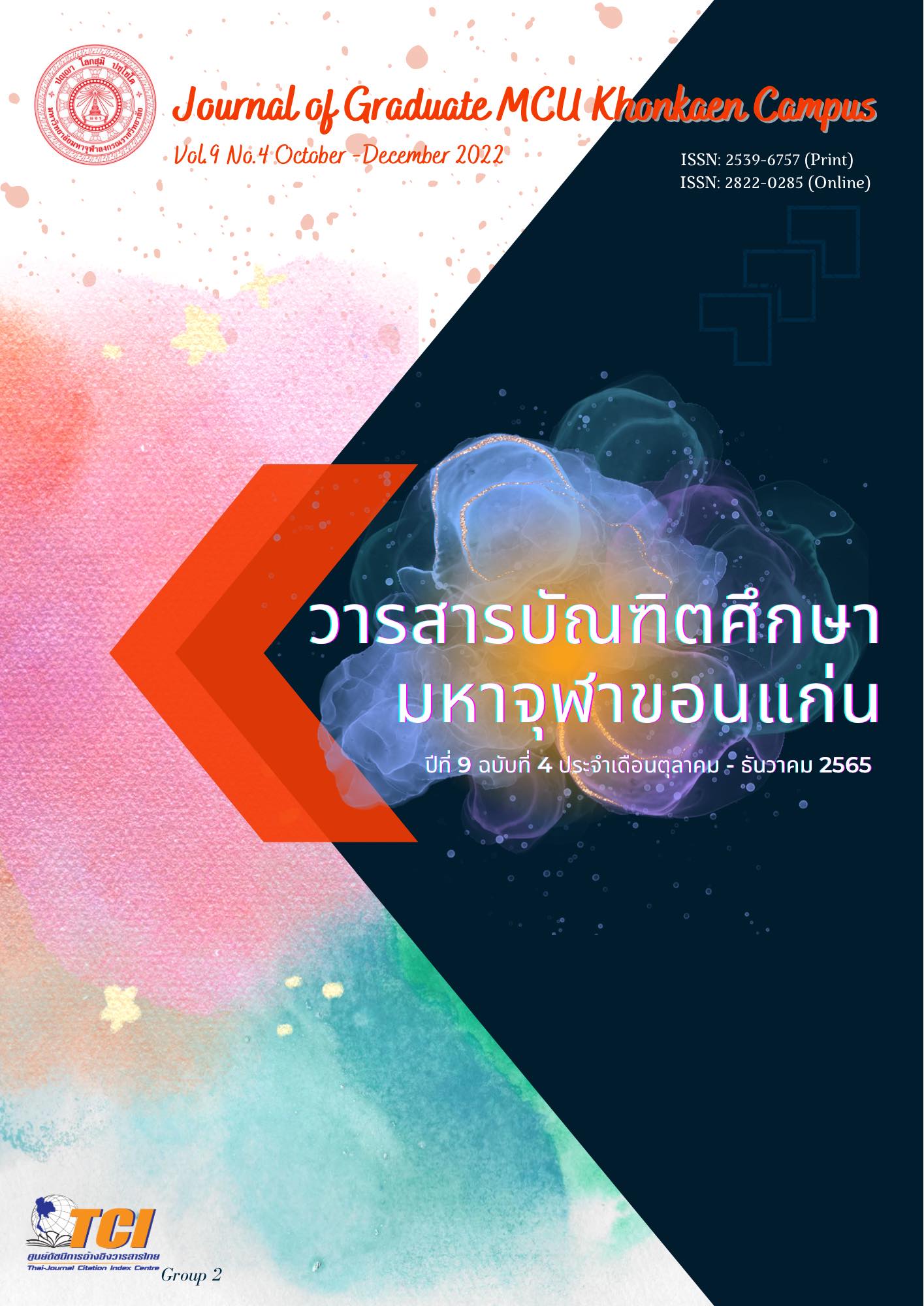The Improvement of English Vocabulary Learning Ability by Using Games for Grade-3 Students
Main Article Content
Abstract
This research is experimental research. The purpose of this study was to compare the student’s English vocabulary learning ability before and after by using games.
The sample group used in this research was 30 students of a government school with in Chachoengsao province. The sample was obtained by simple random sampling of 4 classrooms, totaling 139 students. The classrooms were randomly based on convenience and appropriateness during the epidemic situation of infectious Coronavirus disease 2019 (COVID-19). The research tools were 1. lesson plans for English vocabulary learning ability by using games 2) pre- test and post-test. The statistics used in the data analysis were mean, standard deviation and dependent samples t-test.
The research result can be summarized the students who learned English vocabulary learning ability by using games. The score from post-test for student’s English vocabulary learning ability by using games was higher than the score from the pre-test at the level was significantly .05 and the result of student's vocabulary acquisition is increased by 48.55 percent.
Article Details

This work is licensed under a Creative Commons Attribution-NonCommercial-NoDerivatives 4.0 International License.
References
ภานรินทร์ ไทยจันทรารักษ์, ภัทรินธร บุญทวี และ วงจันทร์ พูลเพิ่ม. (2564). การใช้เกมศัพท์ภาษาอังกฤษเพื่อพัฒนาการเรียนรู้คำศัพท์ภาษาอังกฤษของนักเรียน โรงเรียนสาธิตมหาวิทยาลัยราชภัฏบุรีรัมย์. วารสารคณะครุศาสตร์ มหาวิทยาลัยราชภัฏบุรีรัมย์, 5(1), 163-184.
บุษรีย์ ฤกษ์เมือง. (2552). การใช้เกมคำศัพท์ภาษาอังกฤษเพื่อพัฒนาการเรียนรูคำศัพท์ภาษาอังกฤษของนักเรียนชั้นประถมศึกษาปที่ 4 โรงเรียนบุรารักษ. (วิทยานิพนธปริญญาศิลปศาสตรมหาบัณฑิต). กรุงเทพฯ: มหาวิทยาลัยศรีนครินทรวิโรฒ.
วิภา ตัณฑุลพงษ์. (2549). เกมภาษาสื่อความคิดพิชิตการอ่าน. กรุงเทพฯ: ศูนย์ส่งเสริมวิชาการ.
วรรณพร ศิลาขาว. (2540). การเปรียบเทียบผลสัมฤทธิ์และความคงทนในการเรียนรู้คําศัพท์วิชาภาษาอังกฤษ นักเรียนชั้นประถมศึกษาปีที่ 6 ที่เรียนโดยใช้แบบฝึกหัดที่มีเกมและไม่มีเกมประกอบการสอน. (วิทยานิพนธ์ปริญญาศิลปศาสตรมหาบัณฑิต). กรุงเทพฯ: มหาวิทยาลัยศรีนครินทรวิโรฒ.
อาภรณ์ศิริ พลรักษา.(2561). การพัฒนาความสามารถในการเรียนรู้คำศัพท์ภาษาอังกฤษโดยใช้เกมสำหรับนักเรียนชั้นประถมศึกษาปีที่ 4 โรงเรียนชุมชนเชียงใหม่พัฒนา อำเภอโพธิ์ชัย จังหวัดร้อยเอ็ด. (วิทยานพนธ์ศิลปศาสตรมหาบัณฑิต). มหาสารคาม: มหาวิทยาลัยราชภัฏมหาสารคาม.
เหงียน ถิ หญือ อี๊. (2556). การใช้เกมคำศัพท์เพื่อพัฒนาการเรียนรู้คำศัพท์ภาษาไทยของนักศึกษาชั้นปีที่ 1. มหาวิทยาลัยสังคมศาสตร์และมนุษยศาสตร์ นครโฮจิมินห์ สาธารณรัฐสังคมนิยมเวียดนาม. (สารนิพนธ์ ศศ.ม. (การสอนภาษาไทยในฐานะภาษาต่างประเทศ). กรุงเทพฯ: บัณฑิตวิทยาลัยมหาวิทยาลัย
ศรีนครินทรวิโรฒ.
Allen, E., & Vallette, D. (1977). Classroom Techniques : Foreign Language an English as a Second Language. New York: Harrcount Brace Javarovich Inc.
Ghadessy, M. (1979). Frequency counts, word list and material preparation: A new approach. English Teaching Forum, 17(1), 24-27.
James Coady & Thomas Huckin (1997). Second Language Vocabulary Acquisition: A Rationale for Pedagogy. Cambridge: Cambridge University Press.
Nation, I.S.P. (2001). Learning vocabulary in another language. Cambridge: Cambridge University Press.

